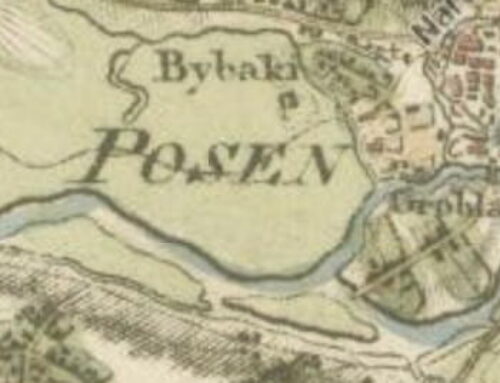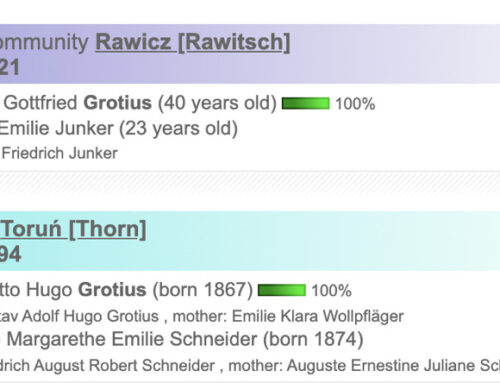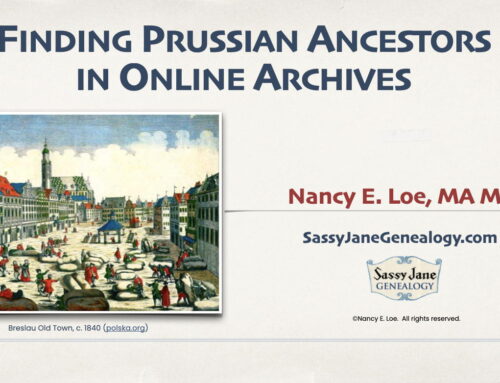Today’s (long) post is about finding Prussian ancestors in Rawitsch. My trip to Poland to discover German-speaking Prussian ancestors is the sixth of eight ancestral trips to the villages of my great-grandparents.
(Read Part Two of my visit to Rawitsch here.)
I’ve been researching my great-grandfather Bruno Kirschstein and the thirteen variations of his surname for many years, and still have several very bricky walls in this line. So, of all the provinces we visited on our trip to Poland, I was most excited to see ancestral locations in Posen, now Poznań.
Did I drive our researcher/guide Ewa Pękalska crazy using German place names, instead of the Polish ones from the past 70 years? Probably. But old research habits die hard. The German names were the only ones I could remember or pronounce!
It’s also worth noting that this area of Poland has been contested for many centuries. So perhaps my readers are relieved to note in this post, I’m not tracking the exact duchy, province, partition, or country where Rawitsch was located for the past 250 years.
Kirschsteins and Brauns in Rawitsch
I remember my father teasing my grandmother Edith (his mother-in-law) about “Bruno.” I wasn’t sure as a child who Bruno was. But just a few census searches revealed he was Edith’s father. The 1920 Chicago census enumerator (God bless him or her) noted that Bruno was born in “Braslau Germany” (Wrocław, Poland). The Hamburger Passagierlisten, 1850-1934 recorded his last residence as Rawitsch, Posen (Rawicz, Poznań ), a town northwest of Breslau.
Staatsarchiv Hamburg, Hamburg, Deutschland: Hamburger Passagierlisten, RG 373-7 I, VIII A 1, Band 049 (1 Jul 1883 – 26 Sep 1883), p. 1340, line 699, entry for “Kirschstein, Bruno.”
From there, I found Bruno Julius Wilhelm Kirschstein’s birth and baptism in 1851 in Rawitsch’s Lutheran parish records. I also found Bruno’s older brother, Eugen, and his sisters, Selma, Olga, and Wally.
I then found records for Bruno’s mother, Florentine Mathilde Braun, and the many branches of her Lutheran families back eight generations and more in Rawitsch. The more I found, the more I wanted to visit this place. It took me eight years, but finally I headed to Posen this summer.
The Archives at Lissa (now Leszno)
Ewa first took us to the regional archives at Lissa. After 35 years working in archives and special collections, I indulged in a delightful busman’s holiday visiting the Archiwum Państwowe w Lesznie. The languages may be different but the reading room, the primary sources, and the archivists helping researchers were  quite familiar.
quite familiar.
If you want to search the digitized records available from this area, click here to get started.
Thanks to Ewa’s expertise, the archives staff had already pulled years of civil death records for us.
I was searching for a death date for Bruno’s youngest sister, Wally, who cared for their mother in her old age. Unfortunately, Wally does not appear to have been in Rawitsch during the twelve years we had time to search. After checking some city directories and newspapers, we were off. I was finally going to visit Rawitsch!
Visiting Rawitsch
The hometown of my mother’s mother’s father, Rawicz today is a bit different from other Polish and European towns we visited. Most feature a square in the zentrum (center) of the stary miasto (old city). But Rawicz today has no town square.
The handsome city hall (below 1) is also the town museum, yielding many delights for the traveling genealogist. We found the lovely oil painting featured above, one of several documenting various eras. There was a town plat locating various points of interest (below 2). My great-great grandfather’s soap factory was not included, alas.
Then I found a true prize: a lavishly illustrated history of Rawitsch (below 3). I hope I didn’t disturb the local watercolor class too much with my genealogy happy dance!

Ewa searches for my g-g-grandfather’s soap factory on the historical map at city hall.

At left: a plaque outlining the history of the Rawitsch town hall, originally built in 1803.
At right, a plaque in memory of the soldiers of the 55th Poznań infantry regiment from Leszno “murdered by the Nazis.”

Rawitsch in History
 The town was founded in 1638 by Protestant refugees from Silesia during the Thirty Years’ War. In just one decade, Rawitsch was:
The town was founded in 1638 by Protestant refugees from Silesia during the Thirty Years’ War. In just one decade, Rawitsch was:
- Destroyed by fire in 1701
- Invaded and occupied by the Swedish army in 1704
- Invaded by Russian forces in 1707, who routed the Swedes and burned the town down.
- Devastated by the black plague between 1710-1711.
So, my ancestors named Braun, Trenkler, Bredtschneider, Guertler, Brand, Jacobi, Scharff, and others, lived through the turbulent early 18th-century in Rawitsch. (I hope my DNA tests can keep up with these demographics!)
The second half of the 1800s were more peaceful. And in 1805, Rawitsch passed from local hands to the Duchy of Warsaw under Napoleon. Ten years later, more Lutherans from Silesia arrived when Rawitsch became part of the Grand Duchy of Posen.
Cloth-Makers in Rawitsch and Related Artisans
Rawitsch citizens, including my great-grandparents, prospered as the town became the largest and most important cloth-making center in Greater Poland (Wielkopolska).
In the record below, my great-great grandfather is a master soap-maker, marrying the “second unmarried daughter left behind by the late Mr. Heinrich Braun, former businessman and art-dyer, Waid dyer, and dyer of precious clothes with different colors.” (Waid was a plant prized for a particular shade of blue.)

Marriage record of Friedrich Kirschstein and Florentine Braun, Rawitsch, Posen, Prussia, 1847.
So, this has been another long ancestor quest post requiring snacks, libations, and comfy chairs for readers. If only I could think of a way to deliver those through a blog! Stay tuned for more on Rawitsch, and posts on visits to other provinces in Poland.
Ancestor Quests:
- Ringebu, Oppland, Norway
- Øvre Eiker, Buskerud, Norway
- Dunnottar, Kincardinshire, Scotland
- Tain, Ross-shire, Scotland
- Ladis, Landeck, Tirol, Austria
- Rawitsch, Posen, Prussia, Part 1 and Part 2
- Freienwalde, Pomerania, Prussia
- Lindesberg, Örebro, Sweden (2019?)








Enjoyed remembering -and now learning more of- your Kirschstein and Rawitsch research, Nancy. You’ve truly done remarkable work and taken those searches so much further than most would/could have done. Hurrah!
So very sorry to have missed you on your last two jaunts to Santa Barbara. This time your presentation lost out to the last day of my brother and sister-in-law’s visit from Pennsylvania. Hopefully I’ll see you on your next trip south.
Best to you and George, and to Fran.
Cari
Thank you, Cari. If you hadn’t taught me Kurrentschrift, I’d still be scratching my head over Bruno.
This is interesting! I heard you last Sat in Santa Barbara. Thank you. I see an old post about Planning a Genealogy research trip in the US, but do you have any other suggestions/posts for planning a genealogy trip to Europe (specifically Germany)? How to find a local guide? What to do about the language barrier, etc? Hoping to go in 2019. Thanks!
Thanks, Cheryl. I love coming to Santa Barbara and sneaking in some time at the Sahyun Library.
I was mulling over the idea of a post on preparing for an international genealogy trip, so now you’ve convinced me it’s a good idea. It will be a few weeks probably, but look for it here.